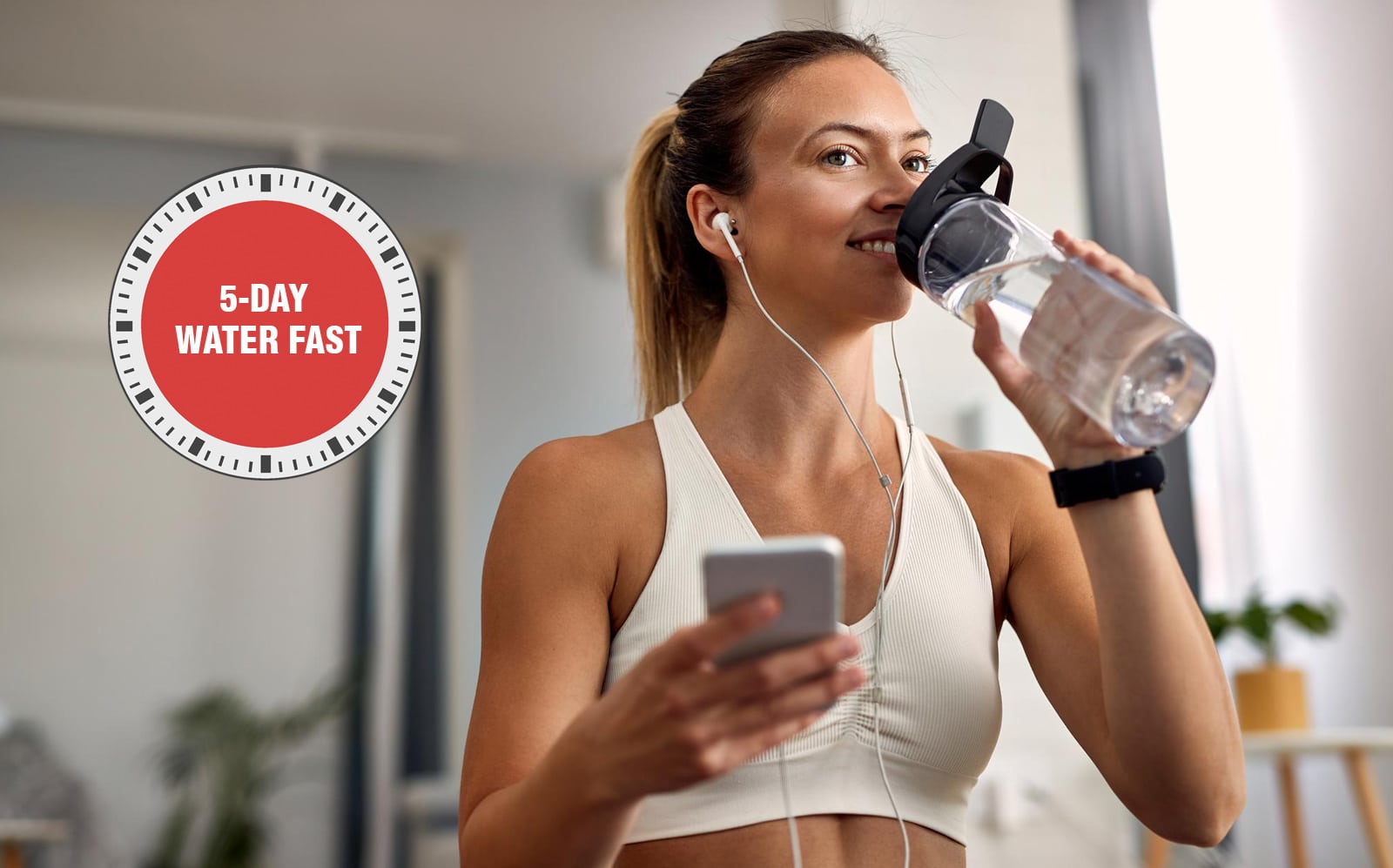The latest fasting trends indicate water fasting (WF) is gaining popularity among fitness enthusiasts. Fasting is an ancient practice with deep historical roots.
A 5-day water fast involves abstaining from all food and caloric beverages and drinking only water. This practice is often used for health benefits like detoxification and weight loss but should be approached with caution.
As a healthcare professional practicing IF for quite some time, I must say that embarking on a 5-day water fast turned out to be more challenging than I initially anticipated. However, I managed to sail through the long fasting hours with a few precautions.
Calculate Your Autophagy Timeline
Find out exactly when your body enters autophagy based on your unique profile, diet, and fasting protocol.
Calculate My Autophagy Window →In this article, I discuss the nuances of the 5-day water fast. I have put together details about how a 5-day water fast can be done with the least friction, the pros and cons of this fasting method, and how you can prepare for this fast.
5-Day Water Fast: What Does it Involve?
A water fast involves abstaining from food and calorie-laden beverages for a certain period. You can only consume plain water during the fasting window. The conventional water fast usually lasts 24 to 72 hours. This can be seen as a form of intermittent fasting.
In the case of a 5-day water fast, the fasting ritual is taken to another level where you must completely abstain from consuming all kinds of food and beverages for 120 hours and stick to drinking water. Hence, under this water-fast regimen, your body is solely dependent on water for nourishment over the course of five days.
Many people view this fast as a step towards trying the 7-day water fast.
How To Prepare For a 5-Day Water Fast
Before beginning any fasting regime, it is best to prep your body so that it can adapt to the new fasting schedule smoothly.
You’re not allowed to eat food during the five-day water fast. This can make it quite challenging for individuals with no prior fasting experience.
If it’s your first time fasting, I’d recommend starting with a beginner-friendly intermittent fasting protocol, as the 5-day water fast may be harsh on the body. You can always begin with shorter water fasts, such as those that last 24 hours or 36 hours, before progressing to the 5-day fasting regimen.
Alternatively, you can try intermittent fasting with shorter fasting windows. Intermitting fasting periods require complete abstinence from food and calorie-containing drinks. This helps your body slowly adjust to the absence of food, preparing you for longer fasting durations. Moreover, your body won’t feel the shock from the restriction of food altogether.
People with medical issues must consult a medical professional before starting a new diet. If your doctor doesn’t recommend this fast, you can discuss alternatives to help you achieve your health goals.
Keep in mind that extended fasting periods need both physical fitness and mental resilience. This is crucial as you’ll have to cope with mood shifts and hunger pangs throughout the fast.
Mental preparation can help you deal with the varying emotions that may surface during and after fasting. Determination is a prerequisite to such prolonged fasts, as is mindfulness. It’s common to find yourself mentally drawn towards emotional eating after completing a 5-day water fast. Overeating post-fasting can diminish the overall benefits of the fast, so it’s important to manage this type of emotional eating.
If you’re planning to jump straight into water fasting without trying any shorter fasts first, it’s important to prep your body by making dietary adjustments in the days leading up to the fast. Opt for healthier food options and cut down on refined grains and processed food like sweets, soda, and alcohol.
Processed and refined foods, being calorie-dense, can affect your weight loss efforts. These items are hard to digest and can disrupt the balance of your gut microbiome.
Also try: Water Fasting Weight Loss Calculator.
Things to Consider During a 5-Day Water Fast
By now, you know how to approach a 5-day fast best. Knowing the correct technique to start this prolonged fast is equally important.
Once you start the 5-day water fast and abstain from food and caloric beverages, ensure you drink plenty of water throughout the fasting duration.
Some consume non-caloric beverages such as green tea, herbal tea, or even low-caloric black coffee during the fast. However, if you are doing so, it is best to check if it works in your stride as sometimes consumption of even mildly caffeinated drinks may not go down well with your system during a fast. (1)
Although several experts suggest drinking only plain water throughout the 5-days of fasting, many individuals supplement plain water with unsweetened, non-caloric electrolytes during their water fast.
While certain electrolytes may be required for digestion and absorption of nutrients such as carbohydrates, remember that your body’s ability to digest carbohydrates may have reduced due to electrolyte depletion after a prolonged water fast. Hence, you must choose low-carb foods to break your fast and opt for food that is gentle on your stomach and is enriched in electrolytes.
Some studies suggest avoiding fluid overload during the re-feed period post-water fasting. They also warn against excessive sodium consumption and recommend limiting it to just the amount required to balance the loss of sodium in your body. (2)
[Tip: Tip: If you’re new to water fasting, it’s advisable to start with a 2-day water fast before attempting a 5-day water fast.]
What Should You Eat After a 5-Day Water Fast?
One of the most effective methods to end a water fast is by sticking to a post-fast diet that is easy to digest. You must give your body adequate time to adjust to your normal diet. When breaking a water fast, you may be tempted to overeat and compensate for the non-eating days. However, this is where you need to be careful. Here are a few tips on reintroducing food into your diet after a prolonged fast.
- Start with a light soup or bone broth after you’ve water fasted for five days.
- Add fresh fruits and vegetables. You can gradually reintroduce relatively higher-caloric meals over the following days.
- Stick to a modest diet for the following fortnight, as it will allow your body time to adjust to caloric consumption changes. Eating high-calorie meals might nullify the fasting benefits.
- Avoid deep-fried food or dairy products.
- Slowly reintroduce legumes, seeds, nuts, and cruciferous vegetables after the 5-day water fast. Although these are all healthy foods, they can be harsh on the stomach right after a fast.
Benefits of 5-Day Water Fast
Studies reveal the benefits of fasting are not just short-term but can also have long-term impacts on the human body. (3)
Here are a few benefits of the 5-day water fast:
May Help in Weight Loss
As the water fast involves calorie abstention, you can expect to lose weight over the five-day period. This weight loss is often due to the shedding of water weight and a minor loss of muscle. Yet, research shows that the body can enter active ketosis after 24 hours, beginning to burn fat for energy. (4)
May Promote Autophagy
Autophagy is a natural process whereby the body eliminates damaged cells. In the process, it replaces dead cells with new cells through recycling. Studies show that abstaining from calories for at least 24 hours can promote autophagy. (5)
May Improve Insulin Sensitivity
Studies reveal that a 5-day water fast may help reduce weight, improve insulin sensitivity, and reduce metabolic syndrome and age biomarkers (6). A 5-day water fast can help your body manage metabolic syndrome symptoms such as a large waistline, high blood pressure, high blood sugar levels, increased blood triglycerides, and low HDL cholesterol.
Potential Risks Associated With 5-Day Water Fasting
Here are the potential risks associated with this prolonged fasting technique:
Loss of Muscle Mass
Your body requires energy to perform its regular functions. During a prolonged fast, your body burns through the glycogen stores for energy. It can also burn muscle as fuel, leading to muscle loss. Loss of lean muscle can hamper the metabolic rate and amplify weight regain post-fasting.
Dehydration and Plummeting Blood Pressure
Food, in addition to water, plays a role in providing the electrolytes your body needs. When you practice an extended water fast of up to five days, you deprive your body of electrolytes that could have been derived from food. Hence, the body has to depend solely on water for electrolytes. Not providing the body with sufficient water could cause dehydration. Nausea, dizziness, and weakness are common dehydration symptoms.
Fasting can put your body at risk of orthostatic hypotension. This is a condition where your blood pressure may decrease, resulting in dizziness. It is common during water fasting and can sometimes increase the risk of fainting.
Besides all the above-discussed risks associated with 5-day water fasting, it is essential to know that people with pre-existing health conditions may face other health issues. It is best to consult a medical professional if you aren’t sure how this fast could impact your body.
FAQ’s
Can I exercise during my 5-day water fast?
Yes, you can exercise during a 5-day water fast. However, it is best to stick to low-intensity exercises during the fast. Remember that your body will be deprived of food throughout the water fast, limiting nutrition supply. Hence, high-intensity exercises aren’t recommended for fasting days.
Is it safe to fast without food for five days?
Yes, water fasting without food and calorie intake is considered safe. However, as it is a prolonged fast, beginners should follow the pre-fasting norms, such as starting with a shorter fasting period and eating healthy during non-fasting hours.
A 5-day water fast may not suit everyone. People with pre-existing health conditions should seek medical supervision before starting a fast. Knowing the potential risks associated with prolonged water fasting is important to approach it safely. You can take cues on how your body responds to a shorter duration fast to be better prepared for longer water fasts.
Can I drink other fluids during a 5-day water fast?
Although limiting your fluid intake to only water during the fast is best, some people include non-caloric electrolytes to prevent dehydration or electrolyte imbalance.
Concluding Thoughts
Abstaining from food and caloric beverages for five days is not easy. However, taking adequate precautions before beginning your fast can contribute to your health goals.
Before attempting a 5-day water fast, it’s crucial to properly prepare your body and ensure that you strictly follow the fasting guidelines. You should follow a healthy diet before and after your fast and avoid overeating upon breaking your fast.
Indulging in binge or emotional eating after a fast can lead to excess calorie intake and reduce the effectiveness of the fasting period. Staying hydrated with plenty of water can be an excellent way to balance your electrolytes. You can add non-caloric electrolyte supplements if needed.
If you are new to fasting, I’d recommend you start with shorter intermittent fasts, such as the 12:12 or 12:8 methods. Subsequently, you can try the 24-hour water fast. This gradual transition will allow your body the time to get acclimatized to staying without food.
However, a 5-day water fast may be easier if you have tried doing a water fast before. Embarking on a 5-day water fast can be a stepping stone for those aiming to progress to a longer, 7-day water fast.
References
Fitness Volt is committed to providing our readers with science-based information. We use only credible and peer-reviewed sources to support the information we share in our articles.
- Spilling the Beans: How Much Caffeine is Too Much? (2023, September 7). U.S. Food And Drug Administration. https://www.fda.gov/consumers/consumer-updates/spilling-beans-how-much-caffeine-too-much
- Mehanna, H.M., Moledina, J. and Travis, J. (2008) Refeeding syndrome: What it is, and how to prevent and treat it, BMJ (Clinical research ed.). Available at: https://www.ncbi.nlm.nih.gov/pmc/articles/PMC2440847/ (Accessed: 14 December 2023).
- Longo, V.D. and Mattson, M.P. (2014a) Fasting: Molecular mechanisms and clinical applications, Cell metabolism. Available at: https://www.ncbi.nlm.nih.gov/pmc/articles/PMC3946160/ (Accessed: 14 December 2023).
- National Center for Biotechnology Information. (n.d.). https://www.ncbi.nlm.nih.gov/
- Anguah, K.O.-B. et al. (2019) Changes in food cravings and eating behaviour after a dietary carbohydrate restriction intervention trial, Nutrients. Available at: https://www.ncbi.nlm.nih.gov/pmc/articles/PMC7019570/ (Accessed: 13 December 2023).
- Jiang, Y. et al. (2021) Five-day water-only fasting decreased metabolic-syndrome risk factors and increased anti-ageing biomarkers without toxicity in a clinical trial of normal-weight individuals, Clinical and translational medicine. Available at: https://www.ncbi.nlm.nih.gov/pmc/articles/PMC8320652/ (Accessed: 14 December 2023)
Tip: If you're signed in to Google, tap Follow.











